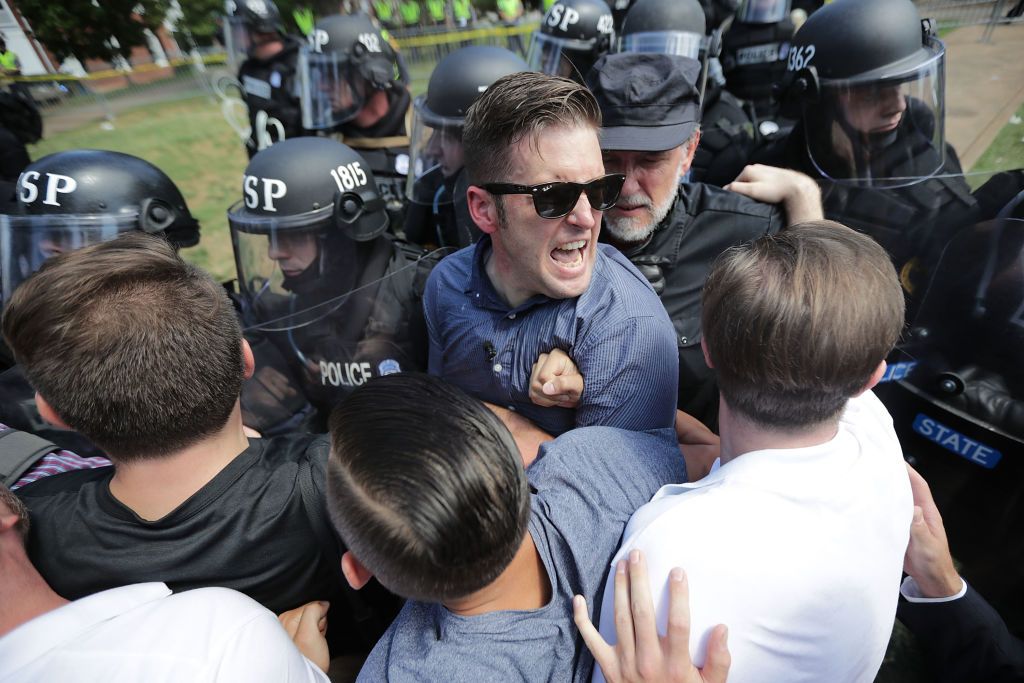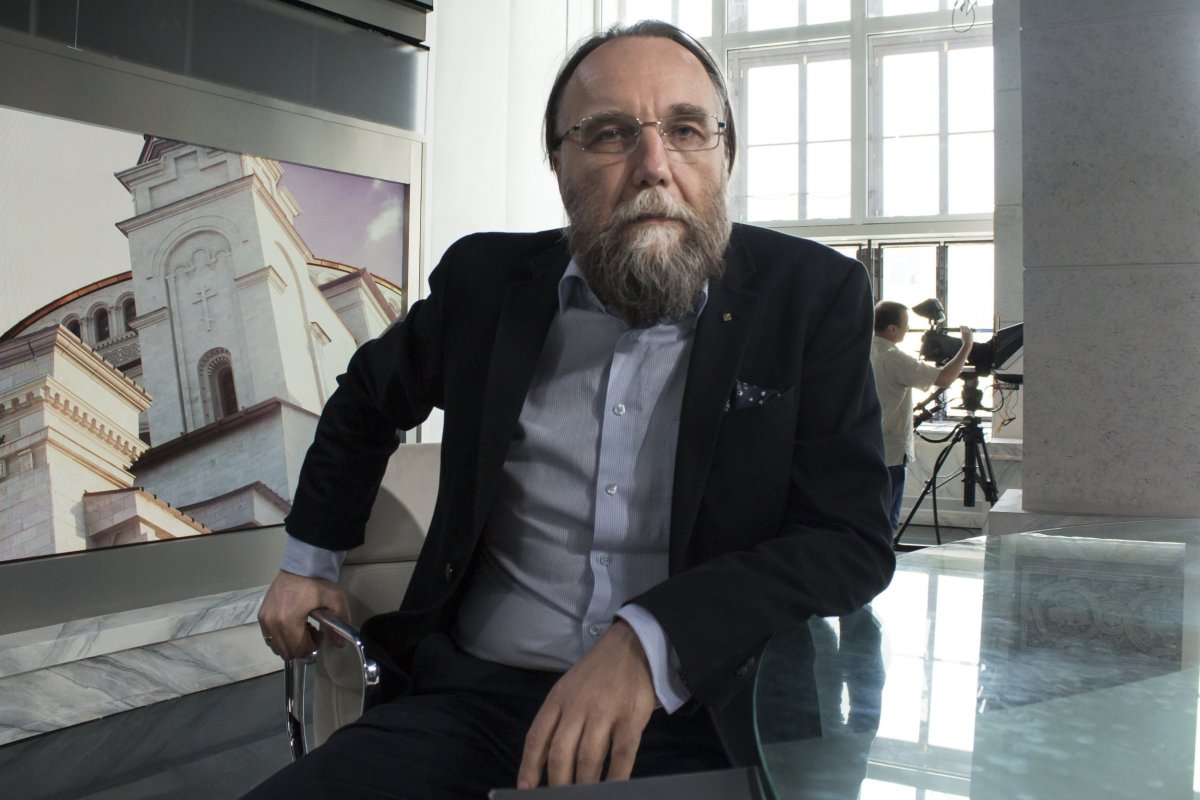
The alleged ties between the administration of President Donald Trump and Russia are currently the subject of intensive media scrutiny. But perhaps less well known are the connections between a Kremlin ideologue described as "Putin's brain" and key members of the U.S. alt-right and white supremacist movement, including those behind the Charlottesville protest.
Alexander Dugin is a Russian ultranationalist and former adviser to Sergei Naryshkin, a key member of Vladimir Putin's United Russia party who was appointed Russian foreign intelligence chief in 2016. Dugin supports Orthodox Russia's role as a bulwark against what he has portrayed as the decadent forces of the liberal West.
Amongst Saturday's headline speakers was Richard Spencer, who claims to have invented the term "alt-right," and has disseminated its white nationalist ideology via his National Policy Institute think-tank, as well as a network of websites and publishing ventures.
Spencer has not disguised his fondness for Vladimir Putin's Russia, describing the country as the "sole white power in the world." In May, he led a smaller protest in Charlottesville, in which torch wielding white nationalists chanted "Russia is our friend."

In 2014, Spencer invited Dugin to an international far-right conference he planned to hold in Hungary, however international sanctions prevented Dugin attending and Hungarian police raided the meeting. Dugin has since become a frequent contributor to Spencer's AltRight.com website, and has also contributed to his online journal Radix. Spencer has returned the favor, penning an article for Dugin's Katehon website.
Spencer's ex-wife is Nina Kouprianova, a tireless promoter of Russian nationalism and self-described "Kremlin troll leaders" who writes under the penname Nina Byzantina. She is also Dugin's English translator.
Matthew Heimbach, co-founder of the white supremacist Traditional Workers Party, also atended Saturday's rally and is a big fan of Putin.
"I really believe that Russia is the leader of the free world right now," he recently told Business Insider. "Putin is supporting nationalists around the world and building an anti-globalist alliance, while promoting traditional values and self-determination."
In 2015, he led a rally at which Russian and Confederate flags were flown alongside each other.
And, for good measure, here's Heimbach with the Novorossiya flag, and leading a rally with both Confederate and Russian imperial flags: pic.twitter.com/5mHjHisfr7
— Casey Michel 🇰🇿 (@cjcmichel) January 4, 2017
Heimbach, described by the Southern Poverty Law Center as the "face of a new generation of white nationalists", has made several trips to Europe to meet the leaders of far-right parties, and at the official launch of the Traditional Workers Party in 2015 Heimbach hosted a Skyped-in congratulatory speech from Dugin.
And one more shot: Heimbach holding both a Dugin book and a neo-Confederate "League of the South" flag. ht @JvanDijkS pic.twitter.com/aY0KfVEhyS
— Casey Michel 🇰🇿 (@cjcmichel) January 5, 2017
The following year he planned his first trip to Russia for the far-right World National Conservative Movement conference, which was ultimately postponed.
Infamous former KKK leader David Duke also made an appearance at the rally, which he called a "turning point" and pledged that white nationalists would "fulfill the promises of Donald Trump."
Like his allies Spencer and Heimbach, Duke has made no secret of his admiration for Russia, describing the country as the "key to white survival," and has been pictured alongside Dugin.
And david Duke and the klan are on the side of Russia, where's that list of people trump won't attack again? White supremacists and putin.. pic.twitter.com/4Nricps1N7
— Trevor Smith (@MrTSmith81) August 15, 2017
Duke once lived in Moscow and owns an apartment in the Russian capital, which he reportedly sub-let to U.S. Neo-Nazi Preston Wigginton, who has in turn hosted web chats by Dugin at the University of Texas A&M college.
On Monday, the college announced it was cancelling a planned white nationalist rally on its campus to be led by Spencer.
Russian state media has also given a platform to Spencer and Duke, where their extremist beliefs were not flagged, and they expounded their racist views unchallenged. Spencer has frequently commented on the Syrian civil war on RT, where he has expressed support for Russian ally and alt-right icon President Bashar al-Assad.
Dugin himself has frequently appeared on Infowars, Alex Jones' pro-Trump conspiracy theory site.
Anton Shekhovtsov, author of Russia and the Western Far Right: Tango Noir, tells Newsweek that ties between U.S. and Russian fascists were longstanding.
"There is no evidence that the Kremlin - as an official body - has ever tried to build ties with the US neo-Nazis such as Spencer or Duke. However, both have long-standing relations with their Russian fascist counterparts," he says in an email.
In Europe, the story is different, with Neo-Nazis in Germany reportedly recruited by Russian intelligence via martial arts clubs, and Hungarian neo-Nazi István Győrkös, who shot dead a police officer last October, running paramilitary training camps for right-wing extremists alongside Kremlin officials.
In a blog posting Tuesday, former NSA analyst John Schindler explained the appeal of Russia to the U.S. far-right.
"Although our country has always had white supremacists, Russia has given them renewed focus and energy, as well as a ready-made worldview. This take on the world includes overt white nationalism which despises the United States as a decadent and multiracial society," he wrote.
Uncommon Knowledge
Newsweek is committed to challenging conventional wisdom and finding connections in the search for common ground.
Newsweek is committed to challenging conventional wisdom and finding connections in the search for common ground.
About the writer
To read how Newsweek uses AI as a newsroom tool, Click here.








